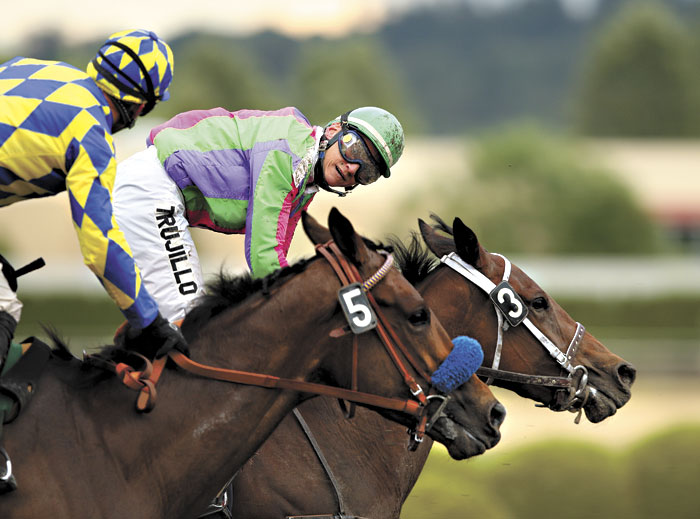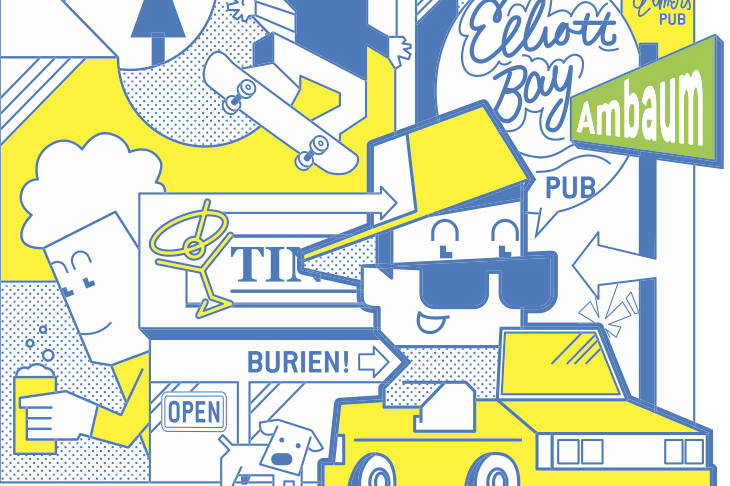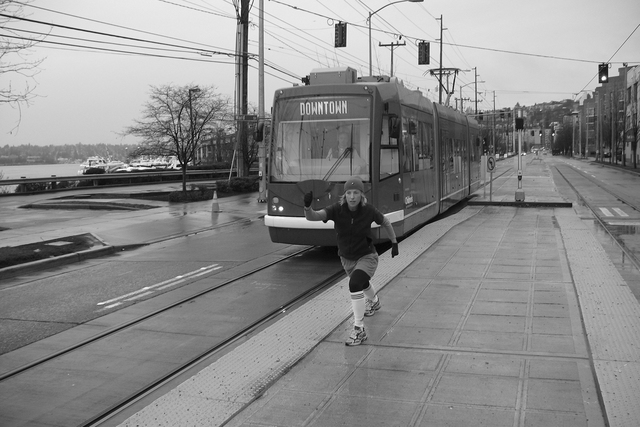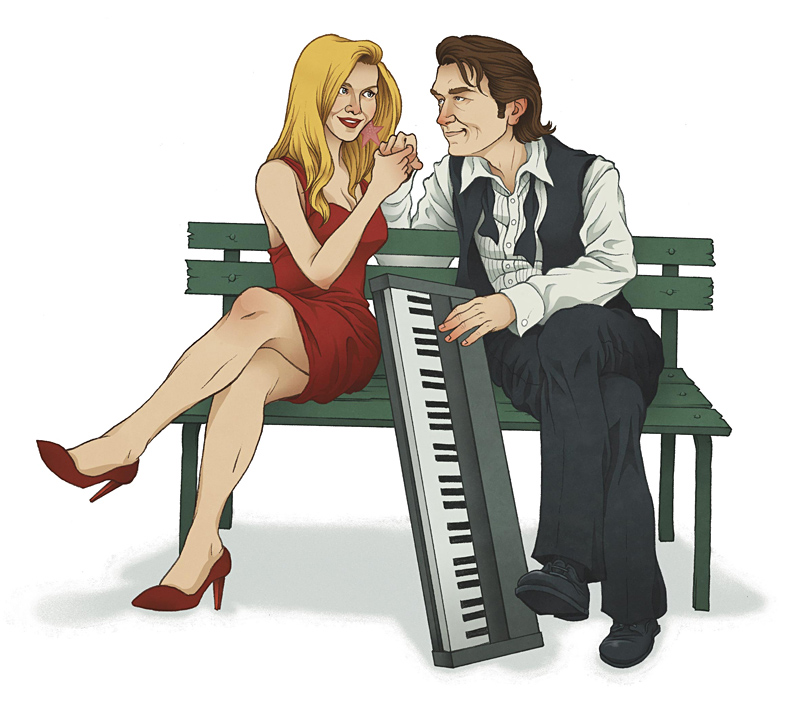Deborah Hoonan and Lisa Trujillo were in high school when they met in the mid-’80s. Hoonan attended Puyallup’s Rogers High, where her father, Pat, was head football coach and athletic director, while Lisa went to Clover Park in Lakewood. The pair had a fair amount in common: Both lived in and attended school in suburban Pierce County, both liked horses and punk rock, and Trujillo’s grandparents lived next door to close friends of the Hoonan family. Both were interested in becoming jockeys at Longacres after graduation, a goal Hoonan was able to realize rather quickly (her mother is a cousin of the Bazes, easily the most accomplished family in the history of Northwest thoroughbred racing). Trujillo went on to become a college writing instructor, and the two would not see each other for another 20 years.
Hoonan was a jockey at Longacres from 1987 until the track closed in 1992. While she exercised horses—keeping them sharp between races through comparatively leisurely jaunts around the oval—for trainers up and down the West Coast for the next 12 years, she would not ride competitively again until 2004, when she resurfaced at Emerald Downs. During her hiatus, she succumbed to, and ultimately kicked, a substantial drinking habit, which contributed to her being too heavy to race.
“I couldn’t tell people who I really was,” explains Hoonan. “[I was] wanting to be numb.”
Newly sober, Hoonan tracked down Trujillo on classmates.com and invited her to the 2004 meet’s final day of racing. Trujillo accepted. It was love at second sight.
“We haven’t been apart since,” says Hoonan, who officially changed her name to Hoonan-Trujillo after the pair got hitched at Vancouver, B.C.’s Stanley Park in September 2006. Those close to her credit the union with helping Hoonan-Trujillo overcome her demons and reach a new plateau, personally and professionally.
“It’s one of the best things that’s ever happened to Debbie,” says Hoonan-Trujillo’s baby sister, Katie Henry. “It’s given her confidence—that sturdy, committed relationship she knows she has, and the support [Lisa] gives her. Her emotional life is so much more under control; it helps her focus on everything else.”
Granted, a pair of lesbians traveling to Canada to get married is not so unusual nowadays. But a jockey being openly gay certainly is.
“There may have been one or two [gay jockeys] back in the day at Longacres, but I don’t think it was spoken of,” says Jennifer Whitaker, a straight woman who is Emerald Downs’ all-time winningest female jockey (Hoonan-Trujillo ranks second). “So in that sense, it’s pretty much unheard of.”
“It’s not that there aren’t any [gay jockeys]; I just don’t know of any,” says William Nack, a celebrated horse-racing scribe who wrote the definitive book on the superhorse Secretariat and narrated the editorial segments which preceded ABC’s recent Belmont Stakes telecast. “The subject never comes up.”
That’s especially true among male jockeys, who outnumber women by a ratio of roughly 10-1. “I honestly feel that a guy [coming out] would be totally different,” says jockey Ricky Frazier, Emerald Downs’ leading rider. He concedes that there may be “gay [male] riders out there,” but doesn’t know of any himself.
Though associated with a sport that’s long adhered to country-music values, the regulars at Emerald Downs seem to have embraced the Hoonan-Trujillos’ status as a couple without breaking stride. Says track announcer Robert Geller: “For Debbie and Lisa’s anniversary, we put it up on the board like we would with anyone else, and no one even blinked. We’re at a track and in a state where people are far more accepting of difference.”
Geller, a native Australian, is gay as well. “Debbie and I have a bond probably because of that,” he says. “A lot of people are not out, but she’s very comfortable with her sexuality, and so am I. For Debbie, her relationship with Lisa is a very big part of her life. They’re so close and so bonded. They’re a breath of fresh air, because a lot of people, gay or straight, have struggled with marriage, relationships, and even themselves. And they’re very inspirational. Debbie’s mom and dad just adore Debbie, and Lisa is embraced by them as well. [Lisa] also puts [Debbie’s] racing world in perspective; she can handle the ups and downs of this industry. A lot of people can’t.”
But will improved perspective and reduced off-track tumult translate into Hoonan-Trujillo climbing the jockey standings at Emerald Downs? Midway through the 2009 meet, the prognosis is murky.
This past winter at Portland Meadows, Hoonan-Trujillo captured the meet’s overall riding title with 89 wins, an elite milestone among jockeys of either gender and an especially lofty one among female riders, who compete on an equal footing with their male colleagues. But in spite of her success down south, Hoonan-Trujillo has remained mired in the middle of the jockey standings at Emerald, widely considered to be a cut above the Portland track. In Auburn, Hoonan-Trujillo is not only not the best jockey, she’s not even the best female jockey (she ranks third behind Cassie Papineau and Whitaker). But the meet is young—it runs April through September—and Hoonan-Trujillo isn’t the anxious type.
“One of the main reasons I use Debbie is her patience for a training program,” says trainer Scott Freeman. “A lot of horses don’t develop until they’ve had eight or 10 starts. So as a trainer, I appreciate that she has the patience and desire to see the horse reach its best level, even if it’s not the best tactic on that particular day.” (Trainers often like to see how a young horse responds to contrasting distances and running styles—going to the lead early or hanging back until the homestretch, for instance—before settling on how best to utilize the horse.)
She’s also something of a horse whisperer, says trainer Sharon Ross, for whom Hoonan-Trujillo won two Seattle Handicaps (a prestigious annual stakes race at the track) aboard Starbird Road. “Her instincts are real good,” says Ross. “She had a lot of information from working [a horse] in the morning that we would apply to races.”
“This is a very demanding sport, and you’ve got to be physically able to hold up,” Ross adds. “These are the best athletes in the world. And Debbie, ever since I’ve known her, has been a workout freak.”
Hoonan-Trujillo works out at her sister’s gym in Sumner, one that eschews high-tech equipment in favor of a “cross-fit” regimen that relies on free weights and other old-school tactics. Says Henry, who teaches and coaches gymnastics at Auburn High School: “It’s kind of a throwback to the military style of working out.”
That’s fitting, because the backstretch lifestyle requires the sort of discipline, long hours, and willingness to decamp to an unfamiliar region that only enlisted men and women can fully appreciate. Debbie rises at 4:30 each morning to work horses for trainers, a daily ritual that begins at the track at 6 a.m. Says her agent, Jeff Brown, “The more you help people out in the morning, the more you ride [in the races].” (The amount of mounts a jockey gets is a Darwinian process as reliant on salesmanship as on skill—hence the presence of agents like Brown, who typically take a 25 percent cut of their clients’ earnings.)
Once the Emerald meet wraps at the end of September, Brown and Hoonan-Trujillo will make a mutual decision whether to return to Portland or try their luck at Phoenix’s Turf Paradise, a popular destination for jockeys anxious to dodge the impending dreariness of a Northwest winter. Hoonan-Trujillo is intrigued by the opportunity, but the prospect of being away from Lisa for long spells gives her pause. (Lisa traveled to Portland every weekend during the meet there.)
Brown, a Tacoma resident who typically shares an apartment with Hoonan-Trujillo near whatever track they choose to compete at while Emerald’s dark, says they’ve still got plenty of time to decide. “You never know until the last month of the meet where you’re going to go next.”
The Hoonans are as close-knit as families come. Henry lives less than a mile from her folks on Lake Tapps, and eldest sister Cindy runs a Bonney Lake apparel company owned by her parents.
Given their father’s athletic predilections, the girls “were in the gym an awful lot growing up,” says Pat Hoonan. And when she wasn’t in the gym, Hoonan-Trujillo was astride a horse, having first been introduced to the animals at age 3.
During the meet, the family’s lakefront home is a popular hangout for track personnel. “They’ve got the boat and the dock and they put on quite a spread,” says Vern Gibson, Hoonan-Trujillo’s longtime tack man (meaning he tends to her equipment—saddles, boots, whips, goggles, etc.). “Everybody’s invited, and they do it a couple times a summer.”
Pat, whose other daughters are straight and have five children between them, says Hoonan-Trujillo came out to him and her mother, Janelle, “sometime after high school. She approached us, and we went from there.” Of Lisa, he says, “She’s a sweetheart, a very nice girl.”
The Hoonan-Trujillos live in Puyallup, across a pasture from Lisa’s grandparents, who Lisa says have “just adopted [Debbie] and consider her their grandchild.” Their acceptance wasn’t instantaneous, however. Until recently, Lisa says her grandparents “probably had pictures in their heads about the most wild thing you’d see at a [Pride] parade.”
Before her wedding, Lisa wrote them a letter explaining that her relationship with Debbie was about love, not sex. Her grandparents were in attendance at the pair’s ceremony in Vancouver.









